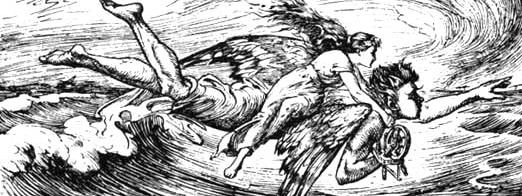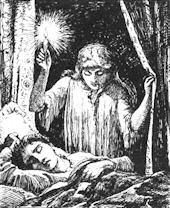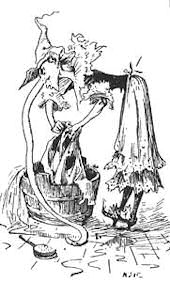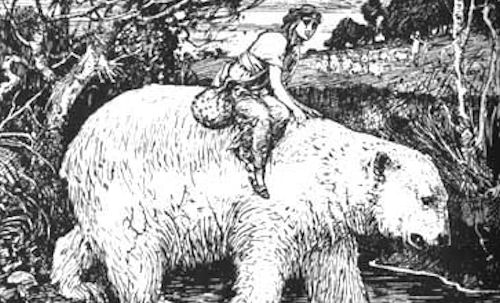




There is one extremely long but never repetitious Fairy Tale that suits Pride and Prejudice in thought and spirit: from Norway it is called East of the Sun and West of the Moon, and much of the detail that refuses to coordinate itself into a crude likeness in Cinderella lines up comfortably here. Instead of Cinderella's hateful stepmother and ugly stepsisters we find in both East of the Sun and Pride and Prejudice a (relatively) normal family of loving and loved parents and siblings. The privations that are visited upon Cinderella alone are suffered by the entire families in this new grouping. (Of course the Bennets do not suffer from lack of food or clothing, as in the Norwegian Fairy Tale, but the precarious state of their finances, should anything happen to Mr. Bennet in the absence of male heir, is made very clear from the earliest chapers of Pride and Prejudice.)
It is in the vulnerability of the family that English Novel and Scandinavian Fairy Tale are coloured with such distinctive and similar shades and hues. For the rest, we have in both stories a tale of misunderstanding and mistrust, unknowing and unforgivable action on the part of the heroine, subsequent loss, regret, and longing, followed by unearned forgiveness. What more could we ask?
Here is the link to a particularly good English version of the story,
which appears to have been translated with simplicity and a great deal of wit:—
http://www.pitt.edu/~dash/norway034.html
(Source: Peter Christen Asbjørnsen and
Jørgen Moe,
Østenfor
sol og vestenfor måne, Norske
Folkeeventyr (Christiania [Oslo],
1842-1852), translated by George Webb Dasent (1859).
Translation revised by D. L. Ashliman. © 2001.)
[In my later webpage References, Fairy Tale and Myth, I offer a few thoughts on the oral tradition of Fairy Tales which to me is inescapable in this translation in a manner not usually apparent to those of us with English as a mother language.]
* * * * *
'Once upon a time there was a poor peasant
who had so many children that he did not have enough of either food
or clothing to give them. Pretty children they all were, but the
prettiest was the youngest daughter, who was so lovely there was
no end to her loveliness.
'One day -- it was on a Thursday evening late
in the fall . . .'
The story continues with three taps being heard at the window. The father goes outside to see a great white bear who comes quickly to the point: if the father will give him his youngest daughter, the bear will make the father as rich as he is now poor.
Unlike most fathers in Fairy Tales, this man, poor as he is, has the white bear wait outside while he discusses the matter with his family. When the youngest daughter, not unreasonably, refuses to consider the proposition, he arranges with the bear to return the following Thursday for his answer. What was the poor girl to do? Acquiescing at last to her father's urging she packs up her meager belongings and climbs onto the white bear's back when he comes to carry her away.
He takes her to a castle filled with beautiful objects of silver and gold, where he gives her a silver bell to ring whenever there is something she wants. Then he leaves her alone at a table set with everything that might tempt a girl from a family who never had enough to eat.
In the evening she is tired from her long journey and plentiful meal. She barely has time to ring the bell when she finds herself in a room where everything is gold and silver, except the bed which is soft and white with silken pillows and curtains. After she has gone to bed, and put out the light, a man comes and lies down beside her. We are told that it is the white bear, who casts off his pelt at night; but the girl never sees him, for he arrives every night after she has put out the light, and leaves before dawn.
She is happy for a while, but at last becomes lonely and homesick for her father and mother, and brothers and sisters.
The white bear agrees to take her to see them, but warns that her mother will want to take her by the hand and lead her into a room to talk alone, and extracts a promise that the girl will not talk to her mother unless the rest of the family is around to hear. Otherwise, says the white bear, you'll bring bad luck on both of us.
Sitting on his back, she travels a long distance to a grand house where her brothers and sisters are running about and playing. Don't forget your promise, says the white bear. If you do, you'll make us both unhappy. And he leaves her alone to meet her family.
They show her their new possessions, and are very grateful for all she has done for them. Then they ask how things are with her.
The girl replies that she has everything she wants. As the white bear had foretold, the girl's mother tries to get her into a bedroom alone in order to talk, but the girl refuses to leave the others. Her mother insists, and the girl recounts the whole story. The mother suggests that perhaps her daughter is sleeping with a troll, and gives her a candle to light when the unknown man who shares her daughter's bed each night has fallen asleep. The girl takes the candle and hides it carefully. Later that evening the white bear comes and takes her away again, warning that if she has listened to her mother's advice bad luck will fall upon both of them, and it will be finished between them.
That night, when the man beside her has fallen asleep, the girl gets up and lights the candle, allowing the light to shine upon him. So handsome is he that she leans over the bed to kiss him, and three drops of hot wax fall onto his shirt, burning him and waking him up.
Angry and heartstricken, the prince explains that if she had trusted him for only one year, he would have been free from the spell that had been cast upon him by his stepmother, a witch, causing him to be a white bear by day, and a man by night. Now he will be forced to leave the girl and return to the witch, who lives in a castle east of the sun and west of the moon, and marry her ugly long-nosed daughter.
The girl cries, to no avail, then asks despairingly if she could go with him. He says that she cannot. Tell me the way, then, she begs, and I will follow you. He explains that there is no path to the stepmother's castle east of the sun and west of the moon, and the girl would never find her way there.
The next morning the prince and the castle have disappeared, and all that remains to the girl are the threadbare clothes she had brought from her old home. She cries for some time, then gathers herself together and resolves to find the prince she has betrayed in her ignorance.
The Fairy Tale journey begins with the girl on foot, as is usual, of course, and she
'... walked many, many days, until she came to a high cliff. An old woman sat under it, and played with a golden apple which she tossed about.'
This is the first of the helpful strangers on the journey, all of whom appear to know that she is the girl who is meant to have the prince, and to be ready to offer all possible assistance in her quest, each lending the girl a horse to ride, and freely offering as well certain gifts to take along in case they might be helpful in her quest. Eventually the horse is replaced by clever personifications of the Four Winds, and the girl travels in turn on each of their backs just as earlier she had been borne from her home by riding on the back of the white bear.
Eventually, and with the help of a fierce but rapidly tiring north wind, the girl is deposited at last at the castle east of the sun and west of the moon belonging to the witch. Twice at night she manages to get into the castle and be alone with the prince, but he is fast asleep and no matter how she calls and shakes him, he does not awaken. Next morning the ugly long-nosed daughter arrives and drives the girl from the castle.
But strangers tell the prince of the woman who comes to his room and spends the night crying and pleading. He realizes the girl has overcome all the obstacles in their path to find him, and immediately gathers the strength to outwit his stepmother the witch and rebuff the long-nosed daughter. He and the girl get married, and lose no time escaping as far away as they can from the castle that lies east of the sun and west of the moon.
And the girl and her family all lived happily ever after.
* * * * *
________________________